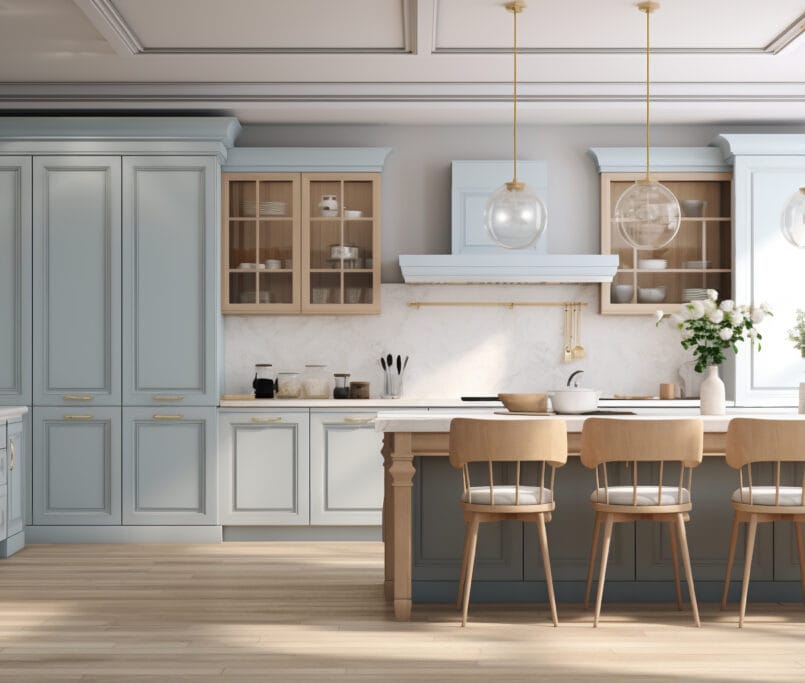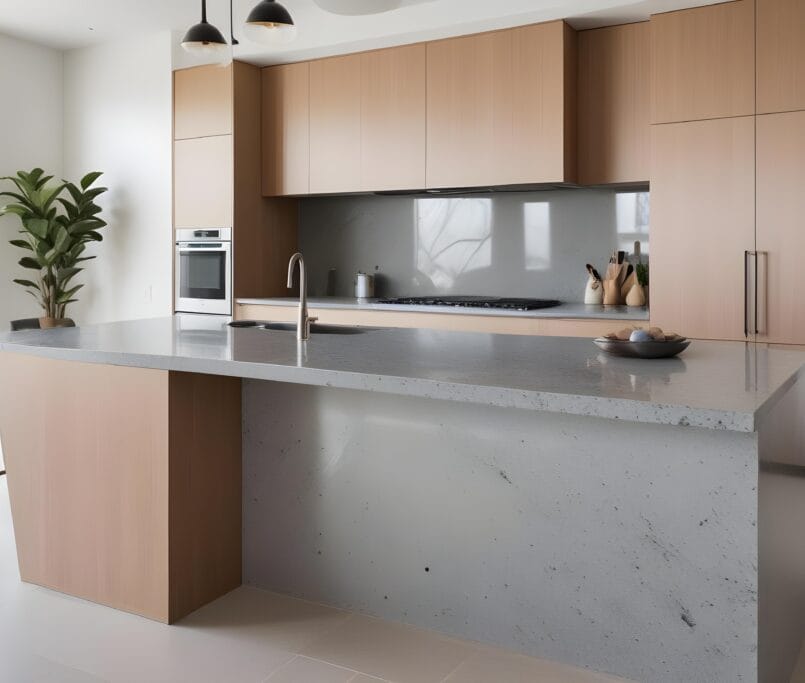Sustainable Elements : 4 Interesting Materials For Kitchen Countertops As A Move Towards Eco-Friendliness
Sustainable elements for the kitchen space in households can be easily sourced from various providers. There are many different materials that are seen to be a sustainable and eco-friendly approach, especially when it comes to choosing the right countertop in your kitchen. Here are 4 interesting materials for your kitchen countertop while taking into consideration the aspect of eco-friendliness.
Sustainable Elements #1: Concrete

Concrete countertops are a great option for sustainable kitchen design, offering a unique blend of durability, versatility and eco-friendliness. Concrete is robust and capable of withstanding the daily wear and tear of a busy kitchen. Its strength ensures longevity while reducing the need for frequent replacements and thereby minimising waste. Sustainability in concrete countertops stems from their potential to additionally incorporate recycled materials such as recycled glass, metal shavings and other reusable elements. This helps divert waste from landfills and reduce the demand for new raw materials.
The production of concrete countertops also presents opportunities for eco-friendly practices. Utilising low-carbon cement alternatives or supplementary materials can reduce greenhouse gas emissions that are typically associated with traditional cement production. Furthermore, concrete’s thermal properties can contribute to energy efficiency in homes by helping to regulate indoor temperatures. This can then reduce reliance on heating and cooling systems; thus, lowering energy consumption and related carbon emissions.
Aesthetically, concrete countertops are highly customisable as it offers a wide range of design possibilities including various colours, textures and finishes. This flexibility allows homeowners to achieve a more personalised look that further complements the intended aesthetics of their home while supporting sustainable design principles. Properly sealed concrete countertops are non-porous which helps in making them hygienic and easy to maintain especially when paired with eco-friendly cleaning products.
Another significant advantage of concrete countertops is their recyclability aspect. Unlike many other countertop materials, concrete can be crushed and repurposed for various construction applications which further contributes to the concept of sustainability. By choosing concrete countertops, homeowners invest in a durable and stylish kitchen feature while making a conscious decision to support sustainable practices while reducing environmental impact.
Sustainable Elements #2: Reclaimed Wood

Reclaimed wood countertops are an excellent choice for those looking to enhance their kitchen’s sustainability and eco-friendliness while adding a touch of charm. These countertops are made from wood which may have been repurposed from old buildings, factories and other structures; therefore, reducing the demand for new wood and helping to minimise deforestation and logging. Repurposing wood gives new life to materials that might otherwise end up in landfills as this is key in aiding waste reduction. Moreover, the energy consumption associated with processing reclaimed wood is significantly lower than that for new wood, making it a more environmentally friendly option.
Reclaimed wood countertops are also durable and can last many years with proper care. They can be treated with non-toxic finishes; thus, ensuring they are safe for food preparation and other kitchen activities. This eco-conscious choice supports sustainable practices where resources are reused and repurposed. Each piece of reclaimed wood is unique as it often features marks like nail holes, knots and other elements that add character and a sense of history to the kitchen. Installing reclaimed wood countertops is not just a design decision but a statement about valuing sustainability and treasuring the environment.
The timeless beauty of the pieces of reclaimed wood can transform any kitchen into a cosy and inviting space alongside showcasing a commitment to responsible resource management. Additionally, sourcing reclaimed wood locally can further reduce the carbon footprint associated with transportation. In summary, reclaimed wood countertops offer a sustainable, stylish, durable and functional solution for modern kitchens while reflecting an appreciation for both the past and the future of our planet.
Sustainable Elements #3: Natural Stone

Opting for a locally sourced natural stone countertop in your kitchen is a key way to promote sustainability. Natural stones such as granite and marble are prized for their durability, timeless beauty and unique characteristics. By choosing stones processed locally, home owners can significantly reduce the environmental impact associated with long-distance transportation; thus, lowering greenhouse gas emissions as an effect. Additionally, this choice supports the local economy by promoting regional industries and employment.
Natural stone is known for its durability. Its long lifespan means it does not need to be replaced frequently which is helpful in reducing waste and the need for additional resources over time. When properly cared for, a natural stone countertop can last for decades and can often be repurposed or recycled at the end of its use. This longevity contrasts with more temporary countertop materials that may need replacement after a few years; hence, contributing to more sustainable living practices.
Aesthetically, each piece of natural stone is unique. This is helpful in offering a distinctive and customisable look that adds character and elegance to your kitchen. The natural variations in colour and pattern mean that no two countertops are exactly alike. This makes each installation a more special and personalised aspect that reflects the earth’s natural beauty. Additionally, natural stone does not emit harmful volatile compounds, which can affect indoor air quality, contributing to a healthier home environment.
By choosing a locally sourced natural stone countertop, homeowners make a commitment to sustainability through reduced transportation emissions, support for the local economy alongside promoting the use of a long-lasting and recyclable material. This choice not only enhances the aesthetic and functional elements of your kitchen but also aligns with environmentally responsible practices.
Sustainable Elements #4: Aluminium

Aluminium countertops are an excellent option for homeowners seeking to enhance their kitchen with an eco-friendly and sustainable approach. Recycled aluminium comes from post-industrial and post-consumer aluminium scrap and these countertops display the principles of recycling and resource efficiency. Aluminium is one of the most recyclable materials as it is able to retain its properties even after multiple recycling processes. This characteristic significantly reduces the need for raw material and its associated environmental impacts. Producing recycled aluminium consumes only a fraction of the energy required to produce new aluminium. This results in lower greenhouse gas emissions and a reduced carbon footprint.
Recycled aluminium countertops are not only environmentally friendly but also highly durable and resistant to stains, heat and corrosion. This makes aluminium an ideal surface for busy kitchens where it can withstand heavy use without easily deteriorating over time. The sleek and modern aesthetic of aluminium complements various kitchen styles, ranging from industrial to contemporary looks; thus, offering a versatile design choice that does not compromise on the aspect of sustainability.
Additionally, the reflective surface of aluminium can enhance lighting efficiency in the kitchen by reflecting both natural and artificial light. This can potentially reduce the need for additional lighting and save on energy costs. Another benefit is the ease of maintenance. Recycled aluminium countertops can be easily cleaned with mild and basic cleaners which is a key aspect in promoting a healthier kitchen environment.
By choosing recycled aluminium countertops, homeowners make a sustainable choice that benefits the environment while investing in a long-lasting, durable and stylish kitchen surface that will last them many years. With proper care, these countertops will last a long time; therefore, making them a wise investment that showcases both sustainability and functionality.






